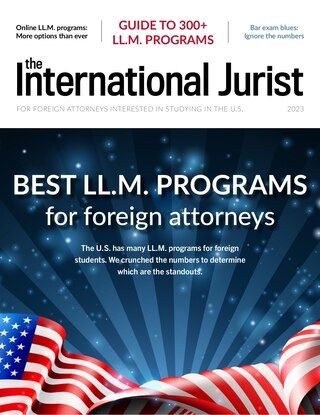By Desiree Jaeger-Fine
The global pandemic impacts every part of our economy, and, of course, it affects current LL.M. students and the future of the program as well.
Some LL.M. students or prospective students may not be aware of the regulatory framework in which LL.M. programs operate. Since the current situation affects the LLM. program and its future, I thought it is an excellent time to look backstage.
This article will likely raise more questions than it can answer at this point. But knowing the issues is a necessary step to be well prepared.
New York State Bar Exam
Online Classes
Under section 520.6 of the Rules of the Court of Appeals for the Admission of Attorneys and Counselors at Law, all coursework must be physically completed at the campus of the ABA-approved law school in the United States. No credit is allowed for distance, correspondence or external study or an online program or course.
Currently, all law schools in New York State moved their classes online for the remainder of the Spring semester. The question this move raised is, what happens to the LL.M. students since LL.M. students cannot use online classes to qualify for the New York bar exam? Law schools have petitioned the New York Court of Appeals for emergency waivers, which have been granted.
What will happen if law schools cannot return to in-person classes by the fall? We do not have an answer yet, but for any prospective LL.M. student who is planning on taking the New York bar exam in the future, I strongly recommend that you monitor the situation closely.
July Bar Exam Postponed
The New York Court of Appeals announced on March 27, that the New York State Bar Examination will not be administered in July as previously scheduled. The examination has been rescheduled to September 9-10, 2. The Board of Law Examiners also announced that:
Due to the fact that the board does not expect to be able to use the large venues it typically uses to administer the exam, the board will not be able to test all the candidates who would typically apply to take the July bar exam. The board will be required to prioritize groups of candidates and expects to announce a staggered schedule for and necessary limitations on applications.
It remains unclear how this announcement will impact LL.M. graduates.
American Bar Association
Standard 313 of the ABA Standards for Approval of Law Schools states that an ABA-approved law school may not establish a degree program other than its J.D. degree program unless the school is fully approved, and the additional degree program will not detract from a law school’s ability to maintain a sound J.D. degree program.
The school must obtain acquiescence prior to commencing such a program. Law schools who are planning to make changes to their LL.M. program for the fall may have to seek acquiescence for those changes.
The ABA reviews these degree programs only to determine whether their offering would have an adverse impact on the law school’s ability to maintain its accreditation for the J.D. program. If no adverse impact is indicated, the ABA “acquiesces” in the law school’s decision to offer the non-J.D. program and degree. Some changes that prospective LL.M. students would like to see may not be possible and may not receive acquiescence.
State Rules
The New York State Education Department must review, approve and register every curriculum (program) creditable toward a degree at a New York State college or university before the institution may offer the program. Other states have similar approval processes. Significant changes to an LLM program will have to go through this approval process as well.
Changes to the LL.M. program have to serve the needs of the students while simultaneously need to comply with the regulatory framework in which it is embedded. Law schools will face challenges in navigating these waters. Still, they are working tirelessly to resolve the issues for the best outcome of their students. Students should, in turn, stay abreast of the situation and gather the necessary knowledge to make informed decisions.
Desiree Jaeger-Fine is director of International Programs at Brooklyn Law School and author of “A Short & Happy Guide to Networking” (West Academic Publishing) and “A Short & Happy Guide to Being Hired” (West Academic Publishing).






